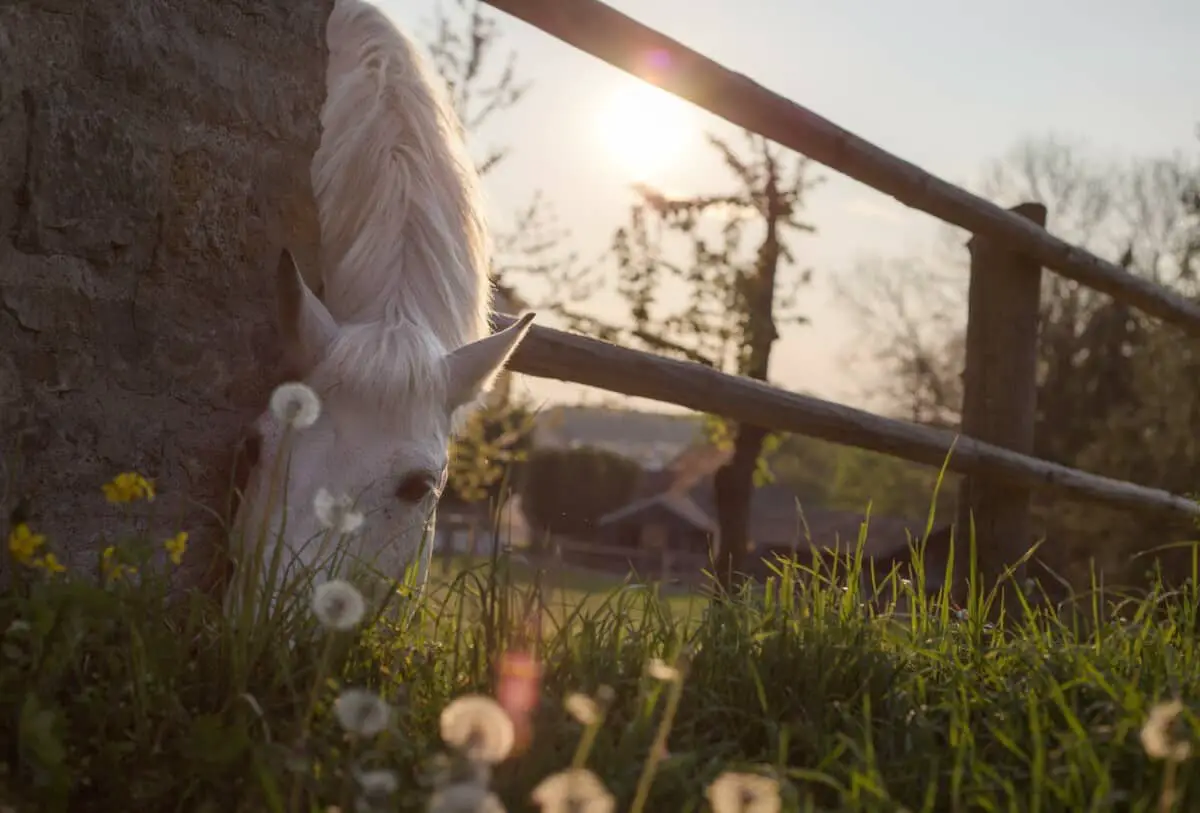Skip To Section
Do Horses Eat Meat?
Horses aren’t supposed to eat meat because they are herbivores. There are other reasons why horses shouldn’t eat meat. However, there have been incidences where herbivores (including horses) have eaten meat.
There are publications that claim horses can eat meat when it is fed to them. The same publications claim horses can seek meat. One such publication is a book dubbed “Deadly Equines ”published in 2011. The book tells a shocking story of a murderous meat-eating horse.
The author, CuChullaine O’Reilly, recounts an alleged true story of two meat-eating horses, “Alexander” and “Bucephalus”. There are many other accounts of horses being fed meat (fish) routinely. In Iceland, for instance, feeding horses dried fish is a common practice during winter to provide Iceland horses with extra protein. The practice has also been recorded in Antarctic with ponies. Some meat (bone meal and beef gelatin) is also present in some horse food products used to improve hoof growth. Apparently, Tibetan horses also enjoy eating grain mixed with blood.
Do Wild Horses Eat Meat?
Probably! Given the above accounts mostly of domesticated horses, it’s likely that wild horses have had a taste of blood or a bite of game meat out of curiosity or necessity. However, it is highly unlikely that all horses, including wild horses would eat meat like carnivores do. As herbivores, the digestive system of horses has been designed to digest plant matter.
Do Horses Eat Other Animals?
There are countless accounts of horses killing other animals. However, such incidences are usually out of defense. As prey animals, wild horses were constantly on the lookout for attacks. Domesticated horses face less danger than their wild counterparts. However, they also get agitated when someone or an animal surprises them from the back. Therefore, horses can kill other animals for defense, playfulness, or by accident, but not to eat them like carnivores do.
Are Horses Carnivores?
No. Horses are herbivores. But they have one stomach only, so they are non-ruminant herbivores. Unlike cows and other ruminants, horses can break down hemi-cellulose and cellulose components in their diet in one stomach.
They also have other digestive system parts like the cecum behind their stomachs that digest roughages using friendly bacteria. A horse’s diet is primarily made up of grass, hay, and concentrates like grain. Horses also enjoy eating fruits and vegetables. Horses shouldn’t eat meat, and this can be attested by their digestive systems.
Should Horses Eat Meat?
No. Horses can’t vomit. So, eating something they aren’t supposed to eat like meat poses more harm to them than to other animals that can vomit. Any toxins or mold that builds up in their stomachs or digestive system can cause serious illness or death.
While a horse’s digestive system can handle small quantities of meat, large quantities can cause a serious buildup of mold and toxins resulting in serious health problems and even death. It’s also worth noting that most accounts involving horses and meat are about horses being given meat as opposed to them seeking meat.
It’s suspected that horses would eat meat for other reasons i.e., to get salt which they love. They may also eat things they wouldn’t normally eat to compensate for deficiencies in their diet. For this reason, it’s critical to feed your horse a balanced diet to stop them from eating what they shouldn’t be eating.

Are Horses Omnivores Or Herbivores?
Horses are herbivores. They are supposed to eat plant matter only. Omnivores eat both plants and animals. Examples of omnivores are pigs. They have digestive systems that match those of herbivores in length. However, they lack fermenting vats present in herbivores.
What Should Horses Eat? How Should Horses Eat?
Horses should eat a lot of roughage. Hay and pasture are enough for horses. In the absence of hay, grain can be a good substitute. However, roughage should dominate a horse’s diet. Their digestive system has been designed to eat grassy stalks amounting to 1-2% of their body weight daily.
Grain can substitute a horse’s diet. However, horses should be fed grain in small quantities frequently instead of one large meal. Horses can’t digest grain effectively when they eat it at once in large quantities. Horses that graze most of the time don’t need a lot of hay. During winter, pasture should supplement pasture. Less is better when it comes to grain.
What you feed your horse is as important as when you feed them. When you change your horse’s ration size or feed type, do it gradually to avoid founder or colic. You should also change each meal at a time over weeks, if possible. The change should be gradual i.e. 25% of their current food. Introduce new food after two days and transition to new food completely after a while.
The importance of a balanced diet can’t be overlooked. Horses, among other animals, will eat what they aren’t supposed to eat mostly because of nutritional deficiencies. Keeping your horse well-nourished is the “key” to ensuring he/she doesn’t eat meat or anything else that is dangerous to their health.
Conclusion
There are accounts of horses eating meat; however, they shouldn’t be eating meat. What’s more, their digestive systems aren’t designed to eat meat. In fact, other factors like the fact that horses don’t vomit makes eating meat very dangerous.
The dental structure of horses is also evidence that they should eat plants only. Horses have flat teeth designed for chewing plants. Carnivores have pointed sharp teeth for tearing flesh. Horses also have longer digestive systems while carnivores have shorter ones allowing food to move quickly.
Like carnivores, horses will occasionally eat on something they aren’t supposed to eat. Lions have been seen on many occasions chewing on grass. However, grass can’t replace their meat diet. In a nutshell, a few incidences of horses eating meat or enjoying some blood mixed with grain shouldn’t be mistaken to mean they are now carnivores (meat-eaters). What’s more, horses shouldn’t be encouraged to eat meat as it puts them in real danger (as discussed above).
